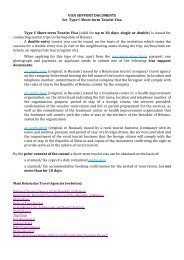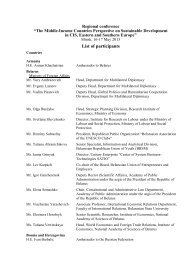Human Development Report 2013 - UNDP
Human Development Report 2013 - UNDP
Human Development Report 2013 - UNDP
Create successful ePaper yourself
Turn your PDF publications into a flip-book with our unique Google optimized e-Paper software.
Without investment in people, returns fromglobal markets tend to be limited. Success ismore likely to be the result not of a suddenopening but of gradual and sequenced integrationwith the world economy, according tonational circumstances, and accompanied byinvestment in people, institutions and infrastructure.Smaller economies have successfullyfocused on niche products, whose success isoften the fruit of years of state support built onexisting competencies or the creation of newones.Driver 3: determined socialpolicy innovationFew countries have sustained rapid growthwithout impressive levels of public investment—not just in infrastructure, but also in healthand education. The aim should be to create virtuouscircles where growth and social policiesreinforce each other. Growth is generally muchmore effective in reducing poverty in countrieswhere income inequality is low than in countrieswith high inequality. Promoting equality,particularly among different religious, ethnicor racial groups, also helps minimize socialconflict.Education, health care, social protection,legal empowerment and social organization allenable poor people to participate in growth.Sectoral balance—especially paying attentionto the rural sector—and the nature and pace ofemployment expansion are critical in determininghow far growth spreads incomes. Buteven these basic policy instruments may notempower disenfranchised groups. The poorfringes of society struggle to voice their concerns,and governments do not always ensurethat services actually reach everyone. Socialpolicy has to promote inclusion—ensuringnondiscrimination and equal treatment iscritical for political and social stability—andprovide basic social services that can underpinlong-term economic growth by supporting theemergence of a healthy, educated labour force.Not all such services need to be provided publicly.But the state should ensure that all citizenshave secure access to the basic requirements ofhuman development.An agenda for development transformationis thus multifaceted. It expands poor people’sassets by increasing public expenditures on basicservices. It improves the functioning of stateand social institutions to promote both growthand equity. It reduces bureaucratic and socialconstraints on economic action and social mobility.It involves communities in setting budgetpriorities and holding leadership accountable.Sustaining the momentumMany countries of the South have demonstratedmuch success. But even in the higherachieving countries, future success is not guaranteed.How can countries in the South continuetheir progress in human development,and how can the progress be extended to othercountries? This <strong>Report</strong> suggests four importantareas to facilitate this: enhancing equity,enabling voice and participation, confrontingenvironmental challenges and managing demographicchange. This <strong>Report</strong> points to the highcost of policy inaction and argues for greaterpolicy ambition.Enhancing equityGreater equity, including between men andwomen and among other groups, is not onlyessential in itself, but also important for promotinghuman development. One of the mostpowerful instruments for this purpose is education,which boosts people’s self- confidenceand enables them to find better jobs, engage inpublic debate and make demands on governmentfor health care, social security and otherentitlements.Education also has striking impacts on healthand mortality. Research for this <strong>Report</strong> showsthat a mother’s education level is more importantto child survival than is household income.Projections also show that policy interventionshave a greater impact in countries and regionswhere education outcomes are initially weaker.This has profound policy implications, potentiallyshifting the emphasis from efforts toboost household income to measures to improvegirls’ education.This <strong>Report</strong> makes a strong case for policyambition. An accelerated progress scenariosuggests that low HDI countries can convergetowards the levels of human developmentFew countries havesustained rapid growthwithout impressivelevels of publicinvestment—not just ininfrastructure, but alsoin health and educationOverview | 5
















